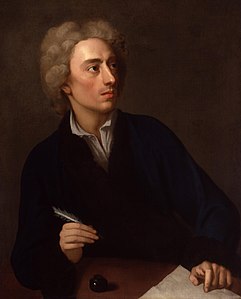Analysis of Farewell to London
Alexander Pope 1688 (London) – 1744 (Twickenham)
Dear, damn'd distracting town, farewell!
Thy fools no more I'll tease:
This year in peace, ye critics, dwell,
Ye harlots, sleep at ease!
Soft B-- and rough C--s adieu,
Earl Warwick made your moan,
The lively H--k and you
May knock up whores alone.
To drink and droll be Rowe allow'd
Till the third watchman's toll;
Let Jervas gratis paint, and Frowde
Save three-pence and his soul.
Farewell, Arbuthnot's raillery
On every learned sot;
And Garth, the best good Christian he,
Although he knows it not.
Lintot, farewell! thy bard must go;
Farewell, unhappy Tonson!
Heaven gives thee for thy loss of Rowe,
Lean Philips, and fat Johnson.
Why should I stay? Both parties rage;
My vixen mistress squalls;
The wits in envious feuds engage:
And Homer (damn him!) calls.
The love of arts lies cold and dead
In Halifax's urn:
And not one Muse of all he fed
Has yet the grace to mourn.
My friends, by turns, my friends confound,
Betray, and are betrayed:
Poor Y--r's sold for fifty pound,
And B--ll is a jade.
Why make I friendships with the great,
When I no favour seek?
Or follow girls, seven hours in eight?
I us'd but once a week.
Still idle, with a busy air,
Deep whimsies to contrive;
The gayest valetudinaire,
Most thinking rake, alive.
Solicitous for others' ends,
Though fond of dear repose;
Careless or drowsy with my friends,
And frolic with my foes.
Luxurious lobster-nights, farewell,
For sober, studious days!
And Burlington's delicious meal,
For salads, tarts, and pease!
Adieu to all, but Gay alone,
Whose soul, sincere and free,
Loves all mankind, but flatters none,
And so may starve with me.
| Scheme | ABAB CDCD XECE FXGX HDHI JKJK LXLX MNMN OPOP FQFQ RSRS AXXB DFIG |
|---|---|
| Poetic Form | Quatrain (77%) |
| Metre | 1101011 111111 11011101 11111 11011101 110111 0101101 111101 11011101 10111 1110101 111011 111 110011 01011101 11111 111111 10101 101111111 1100110 11111101 110101 010100101 010111 01111101 011 01111111 110111 11111101 010101 11111101 011101 11110101 11111 1101101001 111101 11010101 11101 011 110101 01001101 111101 10110111 010111 01001011 1101001 01000101 110101 01111101 110101 1111111 011111 |
| Closest metre | Iambic tetrameter |
| Characters | 1,558 |
| Words | 281 |
| Sentences | 22 |
| Stanzas | 13 |
| Stanza Lengths | 4, 4, 4, 4, 4, 4, 4, 4, 4, 4, 4, 4, 4 |
| Lines Amount | 52 |
| Letters per line (avg) | 24 |
| Words per line (avg) | 5 |
| Letters per stanza (avg) | 94 |
| Words per stanza (avg) | 21 |
Font size:
Submitted on May 13, 2011
Modified on March 05, 2023
- 1:27 min read
- 88 Views
Citation
Use the citation below to add this poem analysis to your bibliography:
Style:MLAChicagoAPA
"Farewell to London" Poetry.com. STANDS4 LLC, 2024. Web. 19 Apr. 2024. <https://www.poetry.com/poem-analysis/465/farewell-to-london>.


Discuss this Alexander Pope poem analysis with the community:
Report Comment
We're doing our best to make sure our content is useful, accurate and safe.
If by any chance you spot an inappropriate comment while navigating through our website please use this form to let us know, and we'll take care of it shortly.
Attachment
You need to be logged in to favorite.
Log In